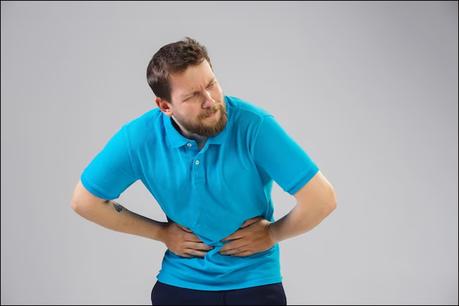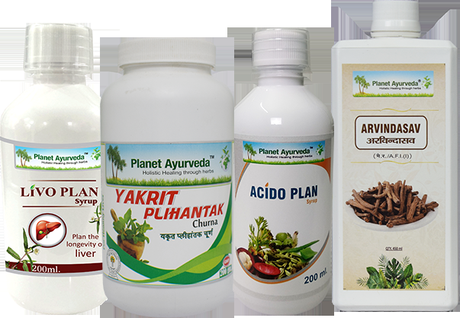Abstract
Bile ducts are thin tubes that carry bile from the liver to the stomach. The bile carried by them is helpful in digestion. Due to blockage of the bile duct, several disorders occur that lead to increased bilirubin levels in the body. The blockage of bile ducts is known as Biliary Atresia. This condition is rare but can be fatal if not diagnosed and managed on time. In this article, we will look at various causative factors, symptoms, and ayurvedic management of Biliary Atresia.
Introduction
Biliary Atresia is a condition in children in which the bile duct is blocked. The bile cannot flow through the ducts and builds up in the liver itself. That can cause various liver disorders including liver damage, jaundice, etc.
There are types of Biliary Atresia
- Perinatal Biliary Atresia
- Fetal Biliary Atresia
Premature children are at greater risk for developing Biliary Atresia. A baby with Biliary Atresia usually seems healthy at birth but the symptoms start occurring after two weeks to two months. Two types of surgeries are used to treat this condition, which may include liver transplant and Kasai procedure. Ayurvedic treatment has a great effect on its management. Both treatment options are discussed further in the article. Choose the best for your child's safe and healthy future.
Ayurvedic Aspect
In Ayurveda liver is known as 'Yakrit' and disorders related to it are called 'yakrit rogas'. The excess formation of bilirubin is due to an imbalance of tridosha in the body, which will cause excessive production of bilirubin. The imbalance of tridoshas in the fetus will cause damage to the newborn's biliary system/bile ducts. All these conditions together will cause the disorder of Biliary Atresia. The treatment includes herbs for the management of the liver and normal production of bilirubin in the liver.
Causes
The causes of Biliary Atresia are unknown, but scarring and damage to bile ducts can occur due to-
- Infections at birth
- Autoimmune problems
- Genetic mutation
Symptoms
Due to blockage of bile ducts, the bilirubin cannot get out from the liver and is not excreted from the body. It gets collected in the liver and causes these symptoms

- Jaundice
- Light colored stools
- Yellowish urine
- Inflammation in the abdomen
- Loss of appetite
- Weight loss
- Liver failure (in some cases)
These symptoms look like other liver conditions like jaundice but the proper diagnosis is needed to rule out possible causes and disorders.
Diagnosis
Diagnosis is confirmed by a pediatrician after a full examination of the baby. Diagnosis may include one or more of the following diagnostic methods-
- Physical examination
- Liver function tests
- Ultrasound
- Liver biopsy
- Hepatobiliary scan
Differential Diagnosis
Symptoms of Biliary Atresia may correlate with symptoms of the following conditions, but proper diagnosis is a must to rule out the exact condition-
- Lipid storage disorder
- Caroli disease
- Alagille syndrome
- Neonatal hemochromatosis
- Congenital herpes simplex virus
- Congenital cytomegalovirus
Complications
- Bleeding in liver
- Blockage in intestines
- Hole in intestine
- Liver failure
Treatment
In modern pathology, there is no Treatment for Biliary Atresia. Surgery is the only option for its management. The surgical procedure for the treatment of Biliary Atresia is known as the 'Kasai Procedure'.. In this surgical procedure, the damaged bile ducts are removed and replaced with a piece of the small intestine that will allow the drainage of bilirubin into the small intestine directly from the liver. However, the success rate is low in many children, and the recurrence rate even after the surgery is high. This can be subjected to loss, with side effects, and undergoing surgery has several side effects. Ignoring side effects it still has chances of reoccurrence. Then what is the option for management besides antibiotics? Well here is the solution. Ayurveda is the solution to your problem. Ayurvedic herbs and therapies help you to recover from this condition and prevent its recurrence. Let us have a detailed look into it.
Herbal remedies for Biliary Atresia by Planet Ayurveda
Planet Ayurveda is a herbal medicines manufacturing company in India. Planet Ayurveda. It has been preparing several herbal medicines that are successfully treating several diseases worldwide. All their preparations are 100% pure and free from chemicals, and preservatives. The medications are used in the treatment of several health conditions. Planet Ayurveda provides the following preparations for the effective treatment of Biliary Atresia.


1. Livoplan Syrup
This syrup is prepared with a combination of various herbs such as Bhringra (Eclipta alba), Kalmegh (Andrographis paniculata), Shyonak (Oroxylum indicum), Bhumi amla (Phyllanthus niruri), Rohitaka (Tecomella undulata), Patol (Trichosanthes dioica), Ghritkumari (Aloe vera), Sharpunkha (Tephrosia purpurea), Dugdhapheni (Taraxacum officinale), Kasni (Cichorium intybus), etc. This tonic helps protect the liver from several hepatotoxins by eliminating toxins from the liver and body. It also allows the healing of damaged liver tissues. It is helpful for damaged liver, alcoholic liver, and viral hepatitis. It promotes strength and helps in maintaining healthy stimulating sluggish liver.
Dosage - Have 1 teaspoon twice daily.
2. Arvindasav
This herbal formulation contains Arvvinda (Nelumbo nucifera), Mansi (Nardostachys jatamansi), Ela (Elettaria cardamomum), Mulethi (Glycyrrhiza glabra), Neelkamal (Nymphaea stellata), Arjuna (Terminalia arjuna), Bala (Sida cordifolia), Nilini (Indigofera tinctoria), Gambhari (Gmelina arborea), Manjishtha (Rubia cordifolia), Vacha (Acorus calamus), Pitpapra (Fumaria parviflora), Amalaki (Emblica officinalis), Patola (Trichosanthes dioica), Muramansi (Selinum tenuifolium), Shyama (Ipomoea turpethum), Bibhitaki (Terminalia bellerica), Draksha (Vitis vinifera), etc. This asav is indicated in all conditions of children. It manages indigestion issues, diarrhea, cough, and weakness by enhancing immunity in children. It strengthens the immune system of a child to fight against several diseases.
Dosage - Take 10-20 drops two times a day.
3. Yakrit Plihantak Churna
It consists of herbs Bhumiamla (Phyllanthus niruri), Bhringraj (Eclipta alba), Kalmegh (Andrographis paniculata), Kaansi (Cichorium intybus), and Sharpunkha (Tephrosia purpurea). This churna promotes healthy liver functioning. It also maintains the spleen functioning along with the liver. All these herbs work together to sustain the good functioning of the hepatic system.
Dosage- Take 1/4th spoon of churna, and mix with Livoplan Syrup and Arvind Asav.
4. Acidoplan Syrup
This syrup consist of herbs- Patol (Trichosanthes dioica), Ghritkumari (Aloevera), Saunf (Foeniculum vulgare), Kokum (Garcinia indica), Pittapapada (Fumaria indica), Shatavari (Asparagus racemosus), Sajjikhar (Soda bicarbonate), etc. This syrup is used in the management of acidity. Bile is an acid in the human body. Excess production of bile is controlled by this syrup which can help in easing the symptoms of biliary atresia.
Dosage- Have 1 spoon two times a day.
Conclusion
Biliary Atresia is corrected through surgery which does not have high success rates. Also, the child may need a liver transplant even if the surgery is successful. Ayurvedic herbs provide proper management of this condition with no side effects and no failures. Keep your child safe and away from side effects with herbal management. For any queries visit us at www.planetayurveda.com
Stay Healthy!! Stay Alive!!
